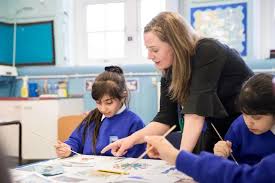
DIPLOMA IN PRE PRIMARY TEACHER TRAINING (2 YEAR)
📘 Course Overview: Diploma in Pre-Primary Teacher Training (PPTT)
🧾 Syllabus Structure
Year 1
- Introduction to Early Childhood Education
- Historical perspectives and theories of child development
- Importance of play-based learning and exploration
- Child Development and Psychology
- Physical, cognitive, social, and emotional development in young children
- Understanding individual differences and diverse learning needs
- Early Childhood Curriculum and Pedagogy
- Principles of designing and implementing developmentally appropriate curriculum
- Creating engaging learning environments for young children
- Teaching Methods and Strategies
- Effective teaching strategies for pre-primary classrooms
- Differentiated instruction to meet the needs of diverse learners
- Language Development and Literacy
- Promoting language development and emergent literacy skills
- Strategies for fostering early literacy through storytelling, rhymes, and language-rich activities
- Mathematics and Science Education
- Introduction to early mathematics concepts and skills
- Hands-on activities and experiments to promote scientific inquiry
- Social and Emotional Development
- Supporting children's social-emotional development and well-being
- Strategies for fostering positive relationships, empathy, and conflict resolution skills
- Health, Nutrition, and Safety
- Creating a safe and healthy environment for young children
- Promoting good nutrition and healthy habits
- Practicum/Internship
- Hands-on experience working in pre-primary classrooms under the supervision of experienced educators
Year 2
- Professional Ethics and Standards
- Ethical considerations in early childhood education
- Professionalism, confidentiality, and maintaining boundaries
- Special Needs Education
- Introduction to working with children with special needs or developmental delays
- Inclusive practices and accommodations to support diverse learners
- Classroom Management
- Techniques for managing diverse classrooms
- Strategies for promoting positive behavior and creating an inclusive learning environment
- Assessment and Evaluation
- Methods of assessing young children's development and learning
- Designing and implementing developmentally appropriate assessments
- Educational Technology in Early Childhood
- Integrating technology into early childhood education
- Using digital tools to enhance learning experiences
- Research in Early Childhood Education
- Introduction to research methods in early childhood education
- Conducting small-scale research projects to inform practice
- Capstone Project
- A comprehensive project that integrates learning from the entire course
- Presentation and defense of the project

